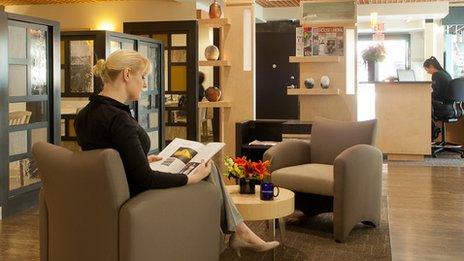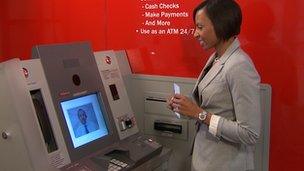Do bank branches just need a makeover?
- Published
- comments

The North Shore Credit Union branch has soft music and lighting
After being met by a concierge as you step through the door, you can help yourself to a cappuccino and a hot towel, and dispatch the children to the Kids' Zone while you relax by the granite rock garden fountain.
Welcome not to a high-end hotel, but to the Financial Spa. It is, in fact, a branch of the North Shore Credit Union in Vancouver, Canada.
There are displays of local artists' work and among the aromatherapy candles, you can discuss loans and insurance in what the credit union describes as a "cosy, semi-private lounge" with soft music playing in the background.
It is all a far cry from the stereotype of a branch of a UK bank, with its long queues, poorly staffed counters and freezing cold draughts from the overused entrance.
Is this boutique, sofa-clad destination modelled in Vancouver the bank branch of the future?
Or, as the Co-op pulls out of a deal to buy more than 600 branches from Lloyds, is there any point in banks having a shop-front at all?
The UK's major banks, running a £9bn current-account market, have a branch network numbering about 10,000.
They appear to have changed little over the years, with a line of counters and a deposit and withdrawal machine tucked into the wall.
New entrants to the UK market have tried to jazz up the look of branches, convinced they remain key to the demands of customers.
For example, Metro Bank is selling itself with a branch network that is open every day except Easter Monday, New Year's Day and Christmas Day, and the doors are not locked until late.
The branding even goes so far as to call their premises "stores", not branches.
"Through our stores we are able to provide traditional banking services and build personal relationships, and as a community bank our ethos is entirely focused on offering amazing customer service," says chief executive Craig Donaldson.
Online v branch
In Vancouver, they are targeting better-off members of the community. Chris Catliff, chief executive of the North Shore Credit Union, says that while their deposits have grown since the Financial Spa makeover, the membership numbers have stalled.

Video cash machines are being introduced by the Bank of America
These affluent customers are likely to be using their laptops, tablet computers and mobile phones for their banking needs too.
Mr Catliff sees the future of retail financial services as one of "bricks and clicks" - with online banking just as important as a branch network.
"Increasingly, banking will no longer be about where you go, but what you do online. As a result, branch investment will decline over time. Having a strong, emotional, physical brand is a leg up for online branding," he says.
The bank branch of the future may see the digital world come into the branches, rather than replace them.
The Bank of America recently announced plans to introduce video cash machines at branches in Boston, followed by the rest of the US later in the year.
The machine will include a screen so customers can talk to a member of staff by video link. In effect, it will be a conference call to a call centre, and will be available later in the day, when counter staff have gone home.
Technology such as this may dilute the importance of face-to-face banking and, according to banking expert Peter Hahn, of Cass Business School, remove the need for traditional branches altogether.
"First the telephone and now the internet allows us to pay our bills and choose our investments from almost anywhere. There can be no doubt that face-to-face contact at the bank branch has been in steep decline for ages," he says.
"It is time to question why we have bank branches at all. Sceptics might say that banks want to keep us coming to branches so that they can sell us something we don't need - and we're much less likely to buy unnecessary stuff from banks on the internet."
He accepts that there is still demand for branches, for those who need to cash a cheque, sign for a mortgage or discuss their savings options face to face. Those communities without any branches often feel left out.

Many people now receive their statement online, rather than in paper from the branch
Yet he still seems far from convinced about the idea of the modern branch.
"In my case, slicker, brighter, safer and more informative branches would be a nice thing to have, but I am not sure they would draw me in beyond curiosity nor would I want to pay for them," he says.
"I have already left a bank when it told me their in-branch deposits had a higher interest rate than their online offering. My view of this was, 'Hey, not only do they want me to waste my time going to the branch, but they are also going to try and sell me something - no thanks.'"
Cashless kiosks
A report by brand consultancy Bancography says there is a long-term future for branches, but they will need to change and adapt with modern technology to remain profitable.
It says cash machines, online banking and mobile banking have not replaced the branch, but have just given consumers more choice. Branches are increasingly popular with customers as their financial lives become more complex with age.
Cashless kiosks could concentrate on basic services, such as opening accounts, and there may even be the possibility of banks linking up with workplaces to allow people to complete transactions from their desks.
"Branches still matter, because consumers say they do. The role of the branch is changing, but the fundamental consumer preference for it endures," the report says.
The collapse of the deal that would have seen the Co-op buy more than 600 branches from Lloyds has prompted more debate about competition in High Street banking in the UK.
But even if the banking names on the High Street do not change, their branches may start to look a little less uniform and a little more imaginative.
And, you never know, they might eventually be the place to go for a nice coffee and a comfy seat.